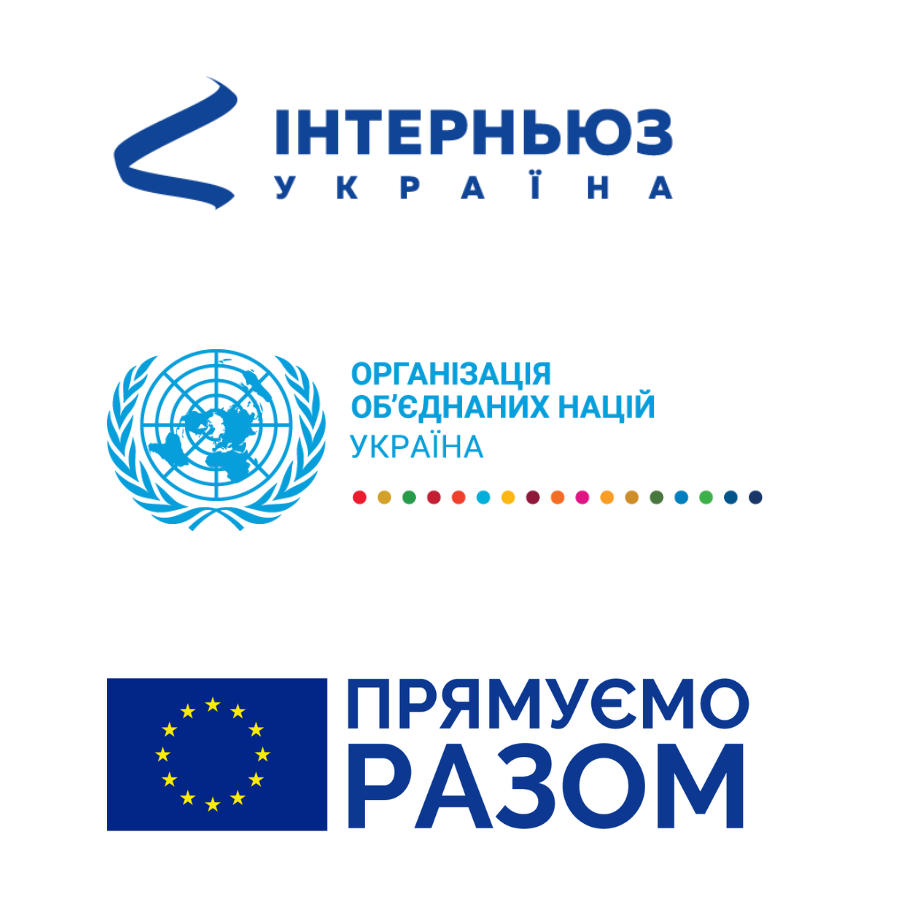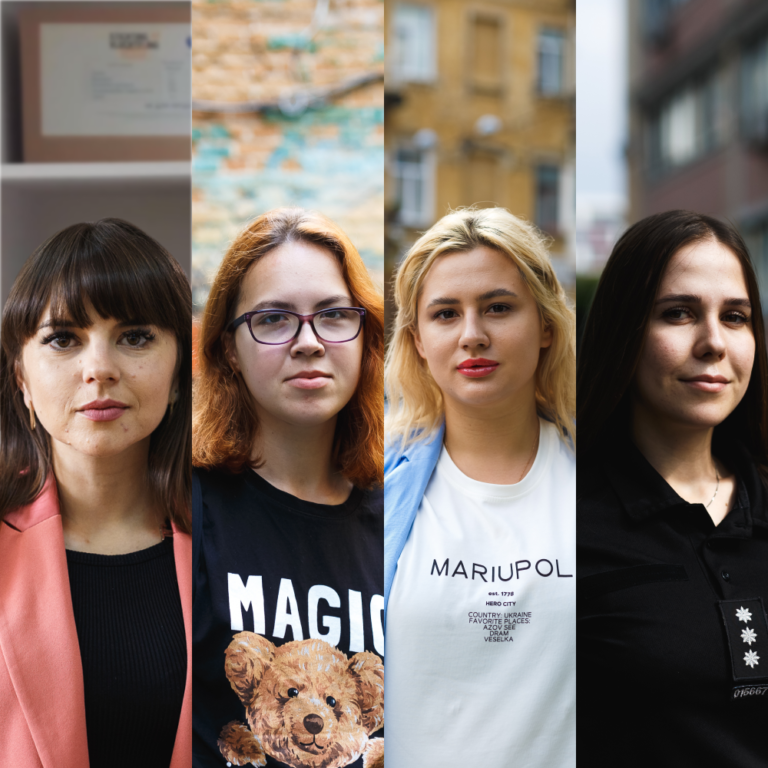Today, many women defend Ukraine. Some of them protect the front. Since the beginning of the Russian invasion, about 6 000 women joined the ranks of the Armed Forces of Ukraine, and as of July, their number was over 38 000. Others ensure a strong rear and are a reliable support for their combat sworn brothers and sisters in hotspots. They weave camouflage nets, make shelter for IDPs (internally displaced persons — ed.), cook hot meals, organize supplies of humanitarian aid, deliver ambulance cars from abroad, raise funds for helping the army, and look after children. Every woman makes their best effort to fight against the enemy.
Hanna Riasna, Iryna Ivannikova, Yulia Simachova and Lina Grozyk are activists born in the East of Ukraine who were forced out of their homes because of the Russian military invasion, both in 2014 and 2022. A part of their lives stays behind in the temporarily occupied cities. Nonetheless, they continue to advocate for the rights of Ukrainian women, promote their public initiatives, and dream of coming back to free Donechchyna and Slobozhanshchyna.
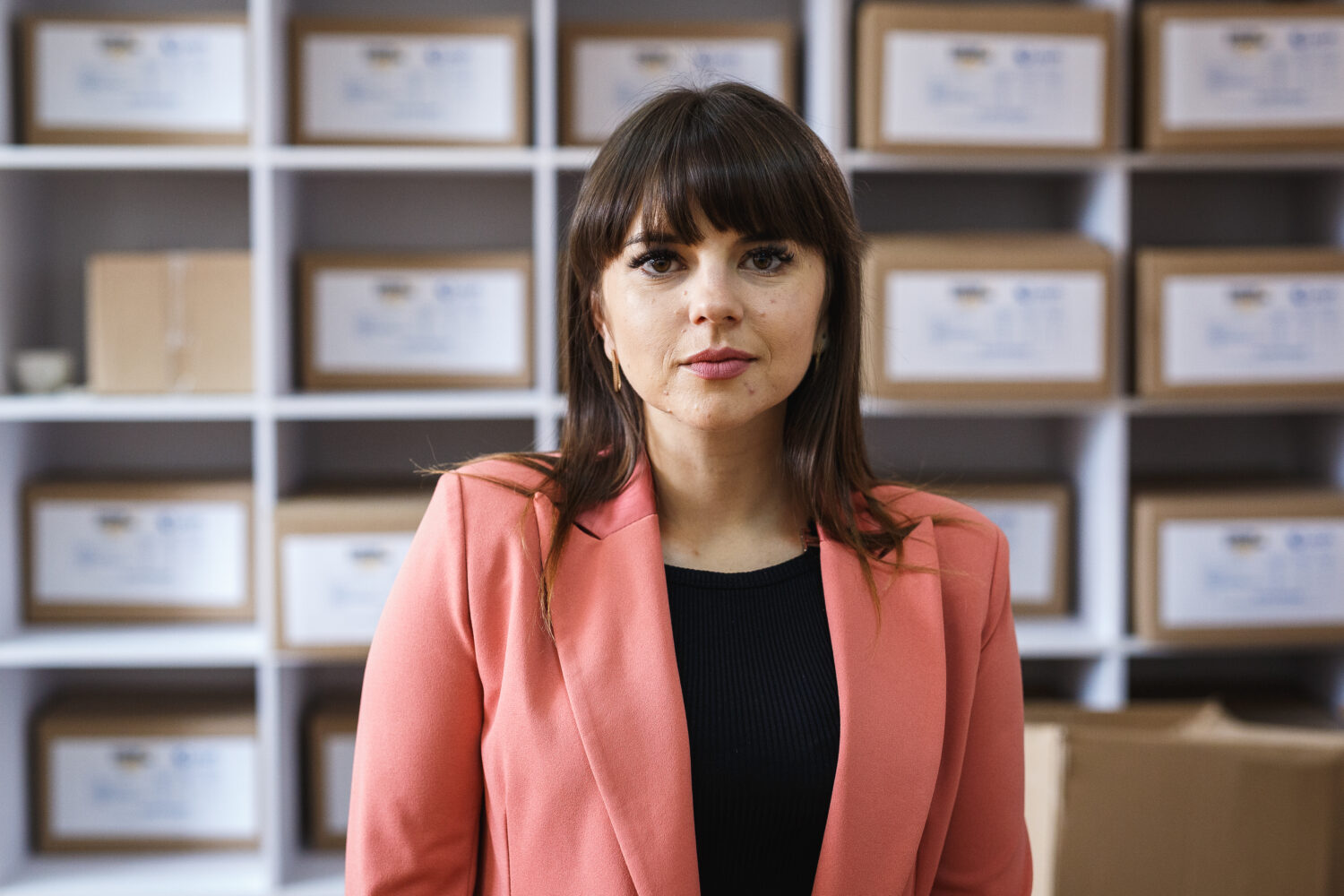
Hanna Riasna, Lysychansk
Hanna is a public activist, director of the Lysychansk municipal Palace of Culture, cultural manager, and member of the Light of Culture NGO. She is also a mother to 9-year-old Yaroslav, and a wife of a member of the Armed Forces of Ukraine. After the full-scale Russian invasion of Ukraine, Hanna and her family were forced to leave their home town of Lysychansk and move to the city of Dnipro. However, she continued to work as a social activist. At first, Hanna focused her efforts on helping displaced people from her region, which has been occupied by Russians since the beginning of July. She gathered like-minded people and started a system of providing for families that left their homes. They provide humanitarian aid at the Luhansk Regional Center of youth initiatives’ support, which together with its workers had moved from the town of Sievierodonetsk to Dnipro.
— Volunteers at our center also mostly left the Luhansk region. So first, we’ve been preeminently helping our region, sending humanitarian aid there. Our hearts hurt for our home in the same way, so we join each other. We process the major part of requests from internally displaced people from Sievierodonetsk and Lysychansk, but we also help residents of the Donetsk region if they reach out to us.
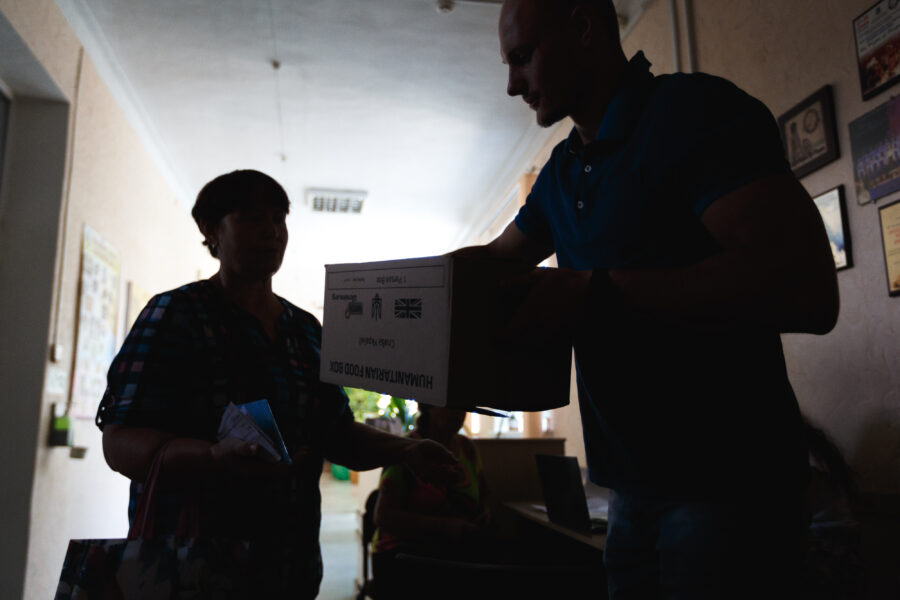
Later, Hanna’s team created a call center and created a database of individuals who needed help. After that, the team started inviting them to get the most necessary things in the live queue order. Hanna always dreamed of opening a space for rest, communication and creative interaction.
— I wanted to create a platform, where young people from the countryside can go and stay for training to not pay for expensive hotels. I imagined it as a youth space, where everyone could get acquainted and communicate. We wanted to establish it in 2022 and had already found partners and a place where it could be born. But, it didn’t happen.
Instead, Hanna set up a shelter for internally displaced people, where some of them stayed for respite before the further moving; others took root and found a new home. Many families have been living there for weeks. As required, all residents of the shelter are provided with medical, psychological and legal care.
— The story of our shelter is a collective story of very different people. There are those who come to us after shelling and children whose parents died. They came with a neighbor who wanted to guide them through their lives and become their guardian. There is a story about the gathering of the whole family, generation after generation, when grandchildren find themselves next to their grandmothers.
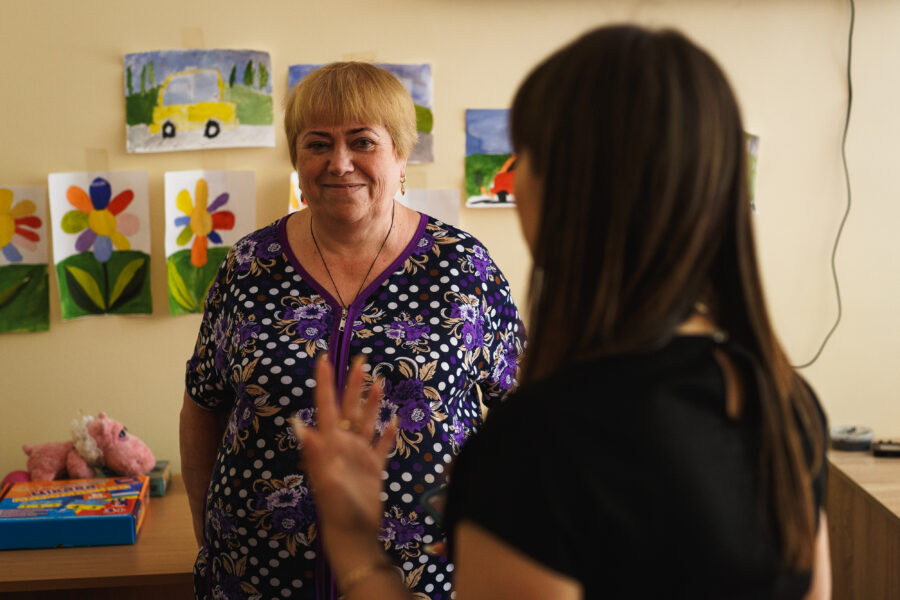
Hanna isn’t going to stop with this achievement. She says that first we need to work for the youth because they are the future. So, Lina is working with her team on projects designed to support young activists who are also seeking change. In the near future — opening a network of mobile offices of Youth Councils in Ivano-Frankivsk, Chernivtsi and Dnipro.
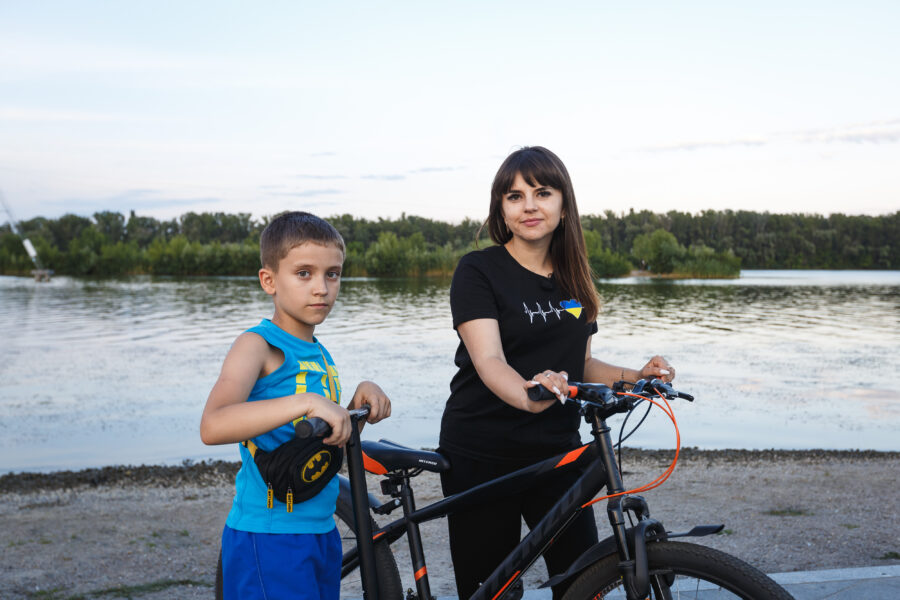
Hanna’s main motivation was, and remains, her son. The war has been lasting for almost the whole life of 9-year-old Yaroslav. According to Hanna, he is proud to be Ukrainian.
— My son knows what war is; he understands who is attacking us. He also attends the volunteer center, unloads some boxes, and in this way becomes tangent to the victory. He proudly says that he is a volunteer who helps soldiers. Yaroslav and I are as one. He probably understands me better than my husband does. I can’t say that I’m a good mother. Rather, Yaroslav would say it; however, I’ll do everything in this life for him.

Iryna Ivannikova, Khrustalnyi
In Iryna’s life, a desire to defend her own borders and fight for the right to be called a Ukrainian came along with the Russian-Ukrainian war back in 2014. At that time, she was a schoolchild who one day woke up from the explosions and afterwards saw the Russian flag at the entrance to the local administration.
— Then, I had a teenage rebellion period. I spoke directly about everything I couldn’t perceive or agree with. One day, I sang the anthem of Ukraine at the Russian language lesson. Later, the resistance was formed. It was a space in social networks where people who supported Ukraine were gathering. We all communicated among ourselves and sometimes met together. However, it was very dangerous because many people were caught and taken to the basement; lots of those captured didn’t get back out there.
Subsequently, the girl left the occupied Khrustalnyi (the town was called Krasnyi Luch until 2016), moved to Naddniprianshchyna to attend university. There she got acquainted with other like-minded people at the association of youth councils and became a social activist. Iryna actively attended different conferences dedicated to leadership, democracy, development and support of youth initiatives. With her colleagues, she later founded the Young Women Peacebuilding Leaders NGO and headed the coordinational headquarters of the Ukrainian association of youth councils.
Back then as an internally displaced person, Iryna felt the prejudiced and dismissive attitude of Russian-speaking people and the region where she was born.
— I came to a little town near Kyiv, where very few displaced people were by that time. And the perception of me was that I came from Donbas and spoke Russian. It automatically meant that I was a bad person. There were even days when I had no money, nobody helped me and I starved. Though I asked people for help, they turned away from me. I suspect that there is a shade of Russian propaganda and stereotypes: if one displaced person is bad, then all other IDPs are bad too.
So among the projects which Iryna worked on, she attempted to refute the prejudice against displaced people. Particularly based on her own experience. She tried to prove that a woman from the East of the country could defend the rights of others.
After the 24th of February 2022, together with the Young Women Peacebuilding Leaders NGO, she helped women evacuate from dangerous cities and go abroad.
— One girl was very afraid of sirens, and we helped her to get out. Then we received new requests. We keep in touch with these girls, and continue to communicate with them.
Every man’s story is important for Iryna. Primarily, she strives to help women to strengthen their potential and provide them with legal and psychological assistance. She is convinced that everything is possible to implement in Ukraine because it’s a country of free and independent people.
— Ukraine is freedom, development, and an opportunity to be yourself. To dress the way you want. To know that if I post something, I will not be taken to the basement. To be yourself and to know that you will not get a bullet in the forehead in return. Today I saw a very good expression: “The will in our thoughts cannot be killed by guns.” For me, that’s what Ukraine is about.

Yulia Simachova, Mariupol
When the full-scale invasion came to her home city, Yulia immediately started helping those who needed it most. At that time, she managed two restaurants that were converted into volunteer kitchens, cooking free hot meals for local residents.
— We started on the 26th of February. In the first days, we fed 300-400 people. On the 3rd of March, the amount increased to 2 000. Then the electricity, gas and water went out. We switched to cooking food by using generators. In the kitchen, not only the restaurant staff cooked, but also my friends joined.
Yulia was also actively engaged in charity work until the 24th of February. Together with her friends, she established a fund which raised money for material and humanitarian aid. Mostly they covered raising funds for helping sick children. After the full-scale invasion, the foundation was transformed to support the Armed Forces of Ukraine and internally displaced people.
Later, Yulia left occupied Mariupol for Sweden, where she stayed for a month and a half. During that time, she constantly kept in touch with her team. They created a chatbot in Telegram for supporting those who left Mariupol and moved to other cities or abroad. They collected all necessary links in one place: different types of helping refugees in Ukraine and outside the country, advice on settling into a new place, and more. In addition, they managed to set up humanitarian headquarters in five Ukrainian cities: Odesa, Kyiv, Mykolaiv, Kharkiv, and Dnipro. Firstly, they focused on helping Mariupol residents, but then they realized that support was equally necessary for people from other regions who were forced to escape from Russian aggression.
— I have few, so to say, ward children, who we look after in the fund. Among them, there is a blind boy with cerebral palsy. Literally before the invasion started, we had been collecting money for his rehabilitation. He needed immediate treatment. I helped him to escape; we took the boy out through so-called DPR. At that time, I phoned and said it as it was: “I’m really ashamed to ask for your help. But if you have a single drop of humanity, help a sick child”. We were lucky, they were released; so now the boy is in treatment in Germany.
Yulia has many common stories. She said that she couldn’t stay away from other people’s pain. Her friends usually joke about it: “You know, this is Yulia!”. They aren’t even surprised with the next fundraising campaign, which she covers in a matter of days, or the number of campaigns and initiatives that she establishes and implements. Once, she walked down the street and met an elderly man. In a short conversation, it turned out that he had cancer. Within a couple of minutes, the woman started collecting food and medicine for him, and mobilized her team.
After returning to Ukraine, Yulia joined the humanitarian headquarters online. There are many volunteers on her team who work 24/7: processing requests, breaking down humanitarian cargo, preparing food packages, carrying and delivering huge boxes. According to Yulia, this dedication to their work is what distinguishes Ukrainian women.
– Our women and girls are a revelation for me! Lots of them did not have any similar experience before the war. But now they are learning and going all out. Our women who weave camouflage nets, volunteers, medical girls who go to the forefront. This is very heroic. These are our cultural values.

Lina Hrozyk, Starobilsk
Her story began with a four-wheeled bicycle. Lina jokingly calls this accident in childhood the start of her fighting for her rights. Once she came home and noticed a boy carrying her vehicle to his yard, she ran after him without hesitation.
— Then I didn’t turn to help from my parents. It wasn’t my mom or dad who set up a showdown, but me. That time, the boy and I strongly quarreled. But, nevertheless, I had defended my property. Thus, since childhood I realized: if the problem exists, it has to be solved.
From then on, she hasn’t stopped. That case also influenced her choice of profession later. Lina chose to work in the Luhansk State University of Internal Affairs (in 2016 was relocated to Sievierodonetsk).
In ninth form, we started playing the military-patriotic game “Dzhura”, in which I took part. Around that time, I understood that I wanted to apply to just such a university, wear the uniform. I want to protect people, defend their rights, and stand up for justice. Act according to conscience.
At the university, Lina instantly joined the cadet student self-government, and took a leadership role. There together with other girls, she solved problems related to the specifics of studying. Lina said that sometimes these difficulties concerned household items and at first glance little things (for example, possibility to take a shower after exercises or improvement and adaptation of the uniform), but she felt internal responsibility to help other girls.
This year, Lina graduated from university, and after that she and the other cadets were offered jobs in this field. Since she was living in occupied Starobilsk, Lina had the primary task to survive. She was at home almost the whole time and realized that it would be impossible for her to build the future in such conditions. So Lina decided to leave her hometown. She chose Dnipro and a job at the local police department in the ranks of the National Police of Ukraine. Over time, she was shifted to a new place, and today she is working as an investigator in the town of Vyshneve near Kyiv.
I’ll return home under one condition: if all is going to be Ukraine. Now, unfortunately, I can’t and to be honest I don’t want to. While I was there, I felt like I was in a cage, though I was living near my relatives. But, I clearly understood: there would be no job for me. I would have my hands tied. So I made my choice. And now I don’t regret anything.
Lina believes that the strength of modern Ukrainian women ultimately lies in the fact that they grow up in an environment of freedom.
— We have every right to speak, to address our concerns, on an equal footing with men. Just take a look at how many of our women join the ranks of the Armed Forces of Ukraine! How they strive to defend and stand up for their children and family from what has happened. I take great pride in our women. We have someone to look up to.
supported by
The story was created with the Internews Ukraine NGO as part of a project for capacity building for the young women from Donetsk and Luhansk regions in the context of promoting the Women, Peace, Security Agenda at the community level. The project was created with the assistance of UN Women. The United Nations Recovery and Peacebuilding Programme is realized by four UN agencies: the United Nations Development Programme (UNDP), the United Nations Entity for Gender Equality and the Empowerment of Women (UN Women), the United Nations Population Fund (UNFPA), and the Food and Agriculture Organization of the United Nations (FAO). The Programme is supported by twelve international partners: the European Union (EU), the European Investment Bank (EIB), the Embassy of the United States of America to Ukraine, and the governments of Denmark, Canada, the Netherlands, Germany, Norway, Poland, Switzerland, Sweden, and Japan.
